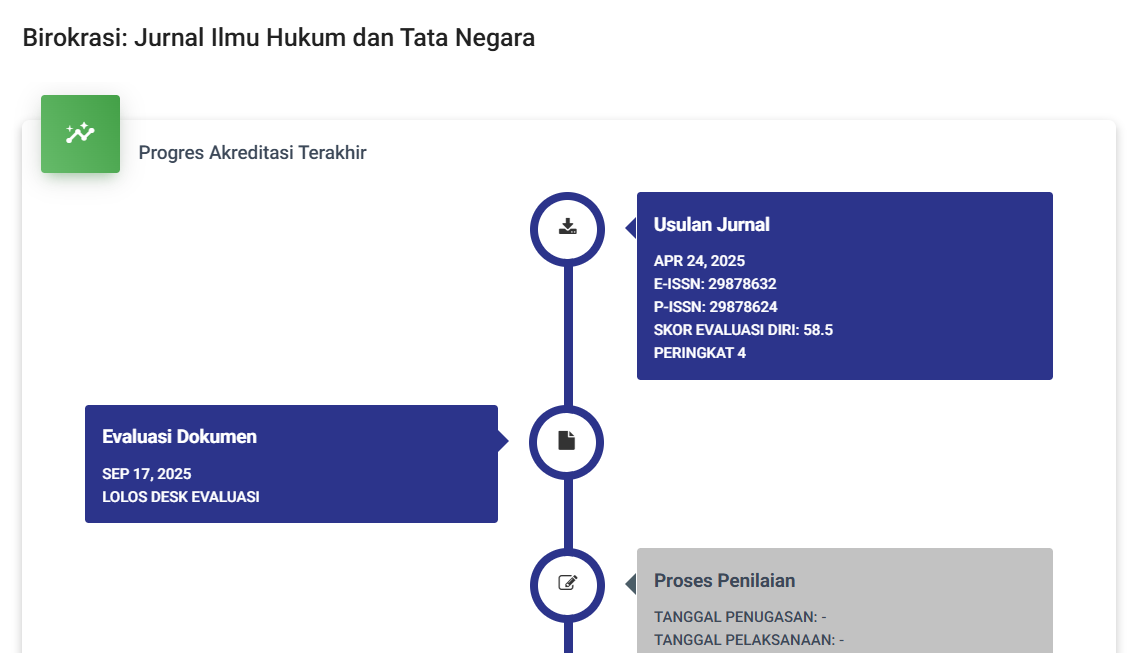Pencegahan Korupsi di Indonesia dalam Perspektif Hukum Administrasi Negara
DOI:
https://doi.org/10.55606/birokrasi.v1i4.730Keywords:
Corruption Practices, Law, Administrative LawAbstract
Corruption is an unethical act, such as embezzlement, accepting bribes, and similar actions. The practice of corruption has permeated all levels of government, including the executive, legislative, and judicial branches, both at the central and local levels. As democracy has developed in Indonesia, the quantity and quality of corrupt activities have also increased. On the other hand, Administrative Law can be described as a guide for government actions, the implementation of activities, the management of public policies, decision analysis, and the tasks of individuals and groups in providing public services and goods. Additionally, Administrative Law is also an academic and theoretical field related to state governance. This research aims to investigate how Administrative Law can play a role in preventing corrupt practices. The results of this study indicate that Administrative Law plays a crucial role in establishing transparent and corruption-free governance. The role of Administrative Law in preventing corruption involves optimizing leadership, improving policy implementation, enhancing the integrity and ethics of the bureaucracy, and increasing public understanding of laws related to corruption.
References
Asaj, I. (2010). Congress of I ASAJ, which will be held in Sydney in March 2010. II. The Jurisdiction of State Administration Courts. (March)
Cahyani, Mutiara Gita, dan RahmaniaRamadhani. 2023. “ANALISIS PERAN HUKUM ADMINISTRASI NEGARA TERHADAP UPAYA PENCEGAHAN PRAKTIK KORUPSI DALAM PEMERINTAHAN.” JurnalRisetRumpunIlmu Sosial, Politik dan Humaniora (JURRISH) 2 (1): 12–22.
Fanani, M. Z., &Zamroni, M. (2018). Function and Role of Administrative Law in the Prevention and Combating of Corruption in Indonesia. Jurnal Reformasi Hukum : Cogito Ergo Sum, 1(1), 9–14. Retrieved from https://ejournal.umaha.ac.id/index.php/reformasi/article/view/199
Maiti, &Bidinger. (1981). KasusKorupsi dan PenyalahgunaanwewenangDitinjaudariPerspektifhukumAdministrasi Negara. Journal of Chemical Information and Modeling, 53(9), 1689–1699.
Manan, H. Bagir. MenyongsongFajarOtonomi Daerah. Yogyakarta: Pusat Studi Hukum Fakultas Hukum Universitas Islam Indonesia, 2001
Riwukore, J. R. (2020). Strategi Pencegahan dan PemberantasanKorupsi di Pemerintah Kota Kupang, Provinsi Nusa Tenggara Timur. Aspirasi: JurnalMasalah-Masalah Sosial | Volume 11, No. 2, 229-242
Rumambi, D. C. (2014). KORUPSI DALAM PERSPEKTIF HUKUM ADMINISTRASI NEGARA. Lex et Societatis, Vol. II/No. 7, 106- 116
Syam, V. Z. (2021). Penguatan Hukum Administrasi Negara PencegahPraktikKorupsi dalam PenyelenggaraanBirokrasi di Indonesia. INTEGRITAS: JurnalAntikorupsi, 7 (2), 325-344
W, A. M. (2022). KEWENANGAN HUKUM ADMINISTRASI TERKAIT PENYALAHGUNAAN WEWENANG DALAM TINDAK PIDANA KORUPSI DI INDONESIA. JurnalKomunitasYustisia.
Yunus, Nur Rohim. “Menciptakan Good and Clean Government.” Nur ElIslam 3, No. 1 (2016): 143-75








